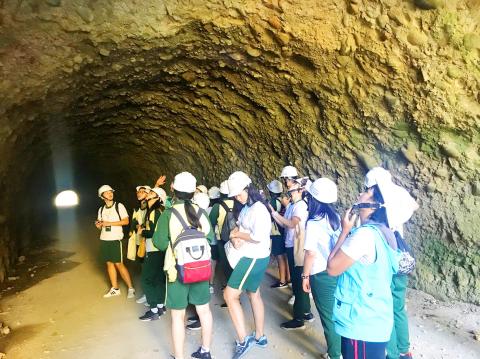Three tunnels along an abandoned road on Shibaluohanshan (Eighteen Arhats Mountain, 十八羅漢山) in Kaohsiung that was once a key route for the camphor oil trade are now popular tourist attractions, and are expected to draw a lot of visitors over the Lunar New Year holiday.
One of the Liouguei Tunnels (六龜隧道) in Liouguei District (六龜) is inhabited by hundreds of Taiwanese leaf-nosed bats, while another is home to a large number of Pacific swallows, all of whom took up residence in the tunnels after 1992, when the road through them that was built in 1936 was replaced by one that bypasses the mountain.
Liouguei District is between the Pingtung Plain and the Central Mountain Range, and its forests, at 800m above sea level, were perfect for camphor trees, said local tour guide Chang Yun-cheng (張運正), whose family has lived in the area for several generations.

Photo: CNA
During the Japanese colonial era from 1895 to 1945, Liouguei was known for its output of camphor oil, which was a key ingredient in insect repellents as well as smokeless powder used in the production of bullets and artillery shells, Chang said.
The lucrativeness of the camphor trade led the Japanese colonial government to construct a route through Shibaluohanshan in the 1930s to facilitate the transport of camphor and logs.
The Japanese drilled six tunnels with a total length of 792m along the route, Chang said.
However, the importance of the tunnels as an economic and strategic lifeline gradually faded after Japan withdrew from Taiwan in 1945.
However, the increase in traffic in the 1980s, with a heavy volume of vehicles carrying visitors to Shibaluohanshan and other forested sites in Liouguei and neighboring Meinong District (美濃) led to the construction of Taiwan Provincial Highway 27A, which opened in 1992. At the same time, Shibaluohanshan was designated as part of a nature reserve, which left the tunnels to wildlife.
The Forestry Bureau reopened three of the tunnels to visitors in September last year, and hired guides to provide tours of their ecological and cultural features.

The Ministry of Economic Affairs has fined Taobao NT$1.2 million (US$36,900) for advertisements that exceeded its approved business scope and ordered the Chinese e-commerce platform to make corrections in the first half of this year or its license would be revoked. Lawmakers have called for stricter supervision of Chinese e-commerce platforms and more stringent measures to prevent China from laundering its goods through Taiwan as US President Donald Trump’s administration cracks down on origin laundering. The legislature’s Finance Committee yesterday met to discuss policies to prevent China from dumping goods in Taiwan, inviting government agencies to report on the matter. Democratic Progressive Party

Taiwan and its Pacific ally Tuvalu on Tuesday signed two accords aimed at facilitating bilateral cooperation on labor affairs, according to Taiwan’s Ministry of Foreign Affairs (MOFA). The governments inked two agreements in Taipei, witnessed by Foreign Minister Lin Chia-lung (林佳龍) and visiting Deputy Tuvaluan Prime Minister Panapasi Nelesone, MOFA said in a news release. According to MOFA, the agreements will facilitate cooperation on labor issues and allow the two sides to mutually recognize seafarers’ certificates and related training. Taiwan would also continue to collaborate with Tuvalu across various fields to promote economic prosperity as well as the well-being of their

Taiwan would welcome the return of Honduras as a diplomatic ally if its next president decides to make such a move, Minister of Foreign Affairs Lin Chia-lung (林佳龍) said yesterday. “Of course, we would welcome Honduras if they want to restore diplomatic ties with Taiwan after their elections,” Lin said at a meeting of the legislature’s Foreign Affairs and National Defense Committee, when asked to comment on statements made by two of the three Honduran presidential candidates during the presidential campaign in the Central American country. Taiwan is paying close attention to the region as a whole in the wake of a

The Taipei District Prosecutors’ Office has continued its investigation into allegations of forged signatures in recall efforts today by searching the Chinese Nationalist Party’s (KMT) city chapter and questioning several personnel including the chapter director, according to media reports. Among those questioned and detained were KMT Taipei chapter director Huang Lu Chin-ju (黃呂錦茹), chapter secretary-general Chu Wen-ching (初文卿), chapter secretary Yao Fu-wen (姚富文) and first district committee executive director Tseng Fan-chuan (曾繁川). Prosecutors said they would not confirm reports about who had been summoned. The investigation centers on allegations that the ongoing recall campaigns targeting Democratic Progressive Party legislators Rosalia Wu (吳思瑤)